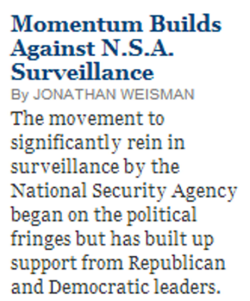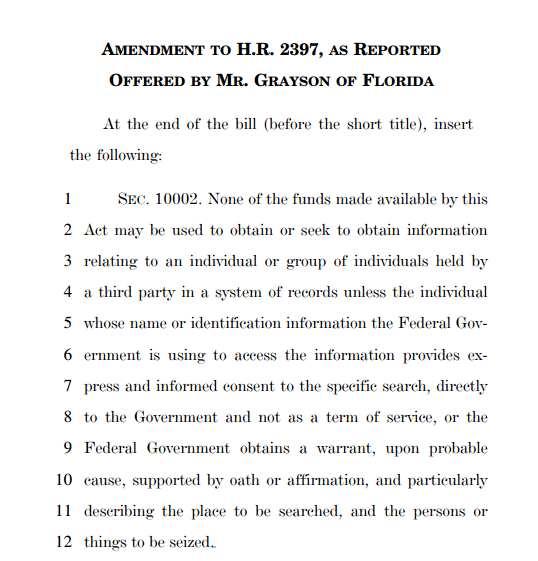by Cindy Cohn and Mark Jaycox, Electronic Frontier Foundation
With each recent revelation about the NSA’s spying programs government officials have tried to reassure the American people that all three branches of government-the Executive branch, the Judiciary branch, and the Congress-knowingly approved these programs and exercised rigorous oversight over them. President Obama recited this talking point just last week, saying: “as President, I’ve taken steps to make sure they have strong oversight by all three branches of government and clear safeguards to prevent abuse and protect the rights of the American people.” With these three pillars of oversight in place, the argument goes, how could the activities possibly be illegal or invasive of our privacy?
Today, the Washington Post confirmed that two of those oversight pillars-the Executive branch and the court overseeing the spying, the Foreign Intelligence Surveillance Court (FISA court )- don’t really exist. The third pillar came down slowly over the last few weeks, with Congressional revelations about the limitations on its oversight, including what Representative Sensennbrenner called “rope a dope” classified briefings. With this, the house of government trust has fallen, and it’s time to act.
by Mike Masnick, TechDirt
(T)he latest report from the Washington Post based on leaked documents shows that an audit of the NSA’s activities shows it broke privacy rules, mostly to spy on Americans, thousands of times per year:
The National Security Agency has broken privacy rules or overstepped its legal authority thousands of times each year since Congress granted the agency broad new powers in 2008, according to an internal audit and other top-secret documents.
Most of the infractions involve unauthorized surveillance of Americans or foreign intelligence targets in the United States, both of which are restricted by law and executive order. They range from significant violations of law to typographical errors that resulted in unintended interception of U.S. e-mails and telephone calls.
The audit info comes from Ed Snowden’s leaks, so it seems rather incredible that President Obama, Keith Alexander and Mike Rogers didn’t seem to realize that this audit would eventually come to light, showing that they were flat out 100% lying to the American public.
by Mike Masnick, TechDirt
The chief judge of FISC, Reggie Walton, who has reacted angrily in the past to the claims of FISC being a “rubber stamp”, has now admitted that the FISC really can’t check on what the NSA is doing and relies on what they tell him to make sure that they’re not breaking the law.
“The FISC is forced to rely upon the accuracy of the information that is provided to the Court,” its chief, U.S. District Judge Reggie Walton, said in a written statement to The Washington Post. “The FISC does not have the capacity to investigate issues of noncompliance, and in that respect the FISC is in the same position as any other court when it comes to enforcing [government] compliance with its orders.”
That’s not quite true. You see, with “any other court” when it comes to “enforcing compliance” things aren’t all hidden away from everyone, so there is scrutiny to make sure that there’s compliance. Not here.
Either way, this again shows just how laughable President Obama’s claims are about the FISC’s oversight abilities:
“We also have federal judges that we’ve put in place who are not subject to political pressure,” Obama said at a news conference in June. “They’ve got lifetime tenure as federal judges, and they’re empowered to look over our shoulder at the executive branch to make sure that these programs aren’t being abused.”
Not quite. Now we know that they rely on the NSA to tell the judges what they might see if they were looking over their shoulders… and the NSA isn’t entirely truthful to FISC about that.
The latest revelation that the House Intelligence Committee withheld surveillance information from Congress before a critical vote to renew the Patriot Act has resulted in pressure from both side of the aisle and government watch dogs on committee chair Mike Rogers (R-MI). The demand is for an explanation of why a document that prepared by the justice department and intelligence community was not shared by the panel’s leadership. From Spencer Ackerman at The Guardian:
The accusations broaden the focus of the surveillance controversy from the National Security Agency to one of the congressional committees charged with exercising oversight of it – and the panel’s closeness to the NSA it is supposed to oversee.
(Michigan Republican Justin) Amash told the Guardian on Monday that he had confirmed with the House intelligence committee that the committee did not make non-committee members aware of the classified overview from 2011 of the bulk phone records collection program first revealed by the Guardian thanks to whistleblower Edward Snowden. The document was expressly designed to be shared with legislators who did not serve on the panel; it appears that a corresponding document for the Senate in 2011 was made available to all senators.
“Nobody I’ve spoken to in my legislative class remembers seeing any such document,” Amash said.
Amash speculated that the House intelligence committee withheld the document in order to ensure the Patriot Act would win congressional reauthorization, as it ultimately did.
On Monday, a former senate staffer Jennifer Hoelzer, who was deputy chief of staff for Sen. Ron Wyden (D-OR), spoke with Amy Goodman of Democracy Now! on President Barack Obama’s proposed changes to reform the government’s surveillance policies and programs.
Full transcript can be read here
“Unfortunately Edward Snowden was the only means by which we have been able to have this debate,” Hoelzer says. “We, working for Senator Wyden, did everything to try to encourage the administration to bring these facts to light. We’re not talking about sources and methods, we’re not talking about sensitive materials, we’re talking about what they believed the law allows them to do.”
As Spencer Ackerman points out in his article, both Chairman Rogers and his ranking Democratic counterpart, Dutch Ruppersberger of Maryland, are “staunch advocates of the NSA bulk surveillance programs.”
This is the government’s definition of “oversight.”



Recent Comments